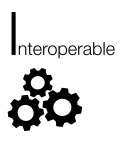FAIR-Prinzipien für Forschungsdaten
Die “FAIR Data Principles” benennen Grundsätze, die Forschungsdaten erfüllen sollen, damit sie nachhaltig nachnutzbar sind. Zudem leiten sich daraus Anforderungen an die Forschungsdateninfrastrukturen ab.
Das Akronym löst sich wie folgt auf: “Findable, Accessible, Interoperable and Re-usable” und postuliert diese Kriterien als Eigenschaften von Forschungsdaten:

- F1. (meta)data are assigned a globally unique and eternally persistent identifier.
- F2. data are described with rich metadata.
- F3. (meta)data are registered or indexed in a searchable resource.
- F4. metadata specify the data identifier.

- A1 (meta)data are retrievable by their identifier using a standardized communications protocol.
- A1.1 the protocol is open, free, and universally implementable.
- A1.2 the protocol allows for an authentication and authorization procedure, where necessary.
- A2 metadata are accessible, even when the data are no longer available.

- I1. (meta)data use a formal, accessible, shared, and broadly applicable language for knowledge representation.
- I2. (meta)data use vocabularies that follow FAIR principles.
- I3. (meta)data include qualified references to other (meta)data.

- R1. meta(data) have a plurality of accurate and relevant attributes.
- R1.1. (meta)data are released with a clear and accessible data usage license.
- R1.2. (meta)data are associated with their provenance.
- R1.3. (meta)data meet domain-relevant community standards.
Übernommen von: https://force11.org/info/the-fair-data-principles/
Weiterführende Informationen finden sich bspw. hier auf forschungsdaten.info.

